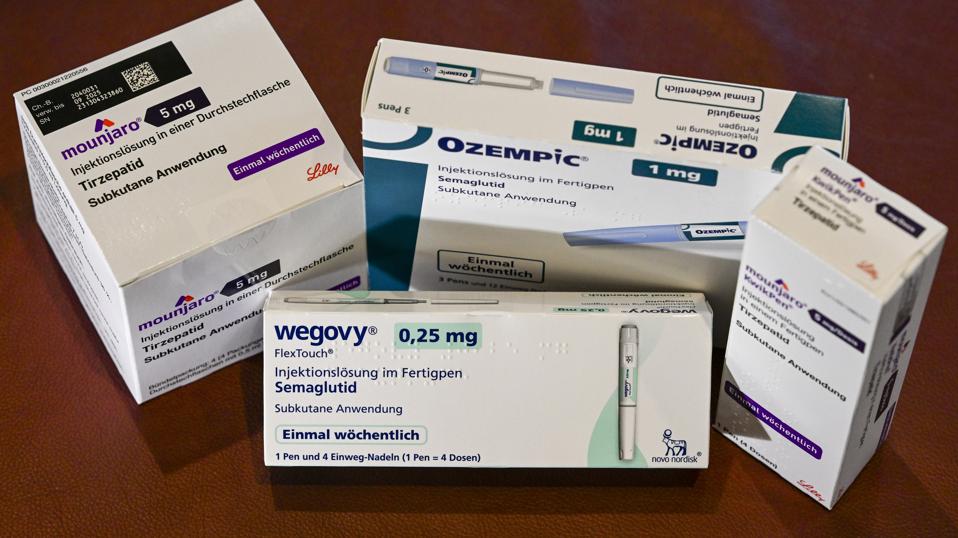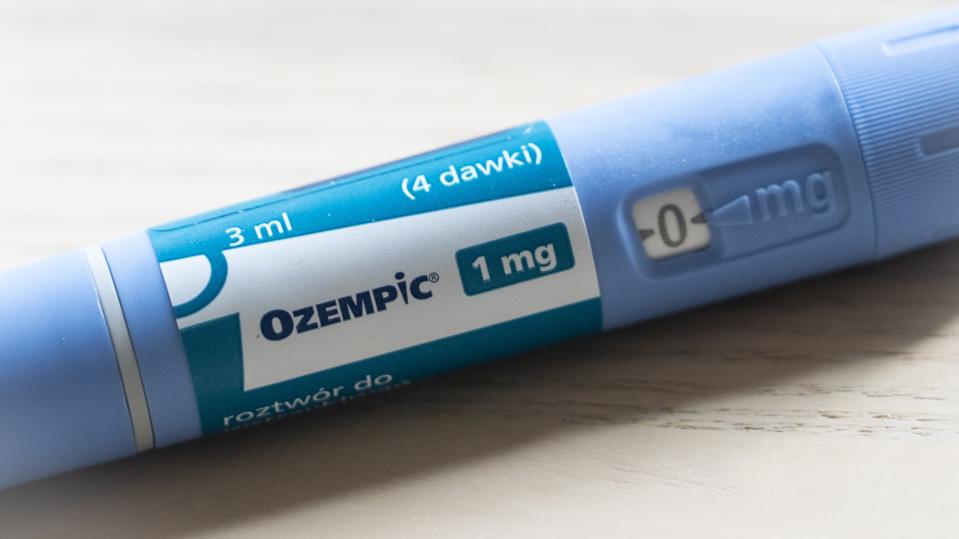A class of drugs that includes popular medications like Ozempic, Wegovy, Rybelsus (semaglutide) or Mounjaro and Zepbound (tirzepatide) has not only proven effective in treating weight loss and diabetes: Mounting evidence suggests these drugs may be effective at treating other conditions like cancer, Alzheimer’s and COVID-19.

Key Facts
- Although the drugs were first approved for Type 2 diabetes maintenance, they were approved for weight loss in recent years, and research has shown they cause significant results: Tirzepatide typically causes patients to lose an average of 22.5% of body fat, while semaglutide causes a 15% reduction.
- However, growing evidence suggests these medications may treat other diseases like cancer, substance abuse, cardiovascular disease and brain disorders like Alzheimer’s and depression.
Covid-19: Semaglutide (ozempic, Wegovy, Rybelsus) Could Impact Death Rate
Although patients taking semaglutide during the COVID-19 pandemic had similar rates of COVID-19 infection compared to the placebo group, those taking the drug had a 33% lower risk of dying from coronavirus infection, researchers found.
Cardiovascular Issues: Semaglutide Drugs May Reduce Strokes, Heart Attacks
An August study found semaglutide reduces the risk of developing cardiovascular conditions like stroke and heart attack in people with heart failure by 28%. The drug also caused a 24% reduction in cardiovascular-related death, and a 19% decrease in all causes of death, according to the study. Previous research also found the drug cuts the risk of stroke, heart attack or death due to cardiovascular disease by 20% in those who are obese or overweight, leading the FDA to approve semaglutide for cardiovascular management in those with higher BMIs.
Diabetes: Tirzepatide Reduces Type 2 Risk
Tirzepatide drastically cut the risk of developing Type 2 diabetes by 94% in people with prediabetes who were also overweight or obese, according to an August study.
Sleep Apnea: These Weight Loss Drugs Can Reduce Sleep Breathing Problems
Researchers found tirzepatide significantly reduces the number of breathing interruptions during sleep—one of the main factors to measure disease severity—for obese people with moderate-to-severe obstructive sleep apnea. Some patients saw such drastic improvements that they may no longer need their continuous positive airway pressure (CPAP) machines, which keep airways open, while sleeping.
High Blood Pressure: Weight Loss Drugs Can Reduce Threat
Overweight and obese patients taking tirzepatide saw significant decreases in their blood pressure—especially those taking the highest dose of the medication—a February study found.
Alcoholism: Ozempic Could Reduce Alcohol Use Disorder
Obese patients who took semaglutide saw between a 50%-56% decrease in the risk of alcohol use disorder and the recurrence of it. The researchers replicated the study using patients with Type 2 diabetes, and found similar results
Kidney Disease: Semaglutide Could Prevent Chronic Issue
Participants taking semaglutide who had Type 2 diabetes and chronic kidney disease had a 24% lower chance of experiencing a major kidney-related event like kidney failure, according to research by the New England Journal of Medicine.
Cancer: 10 Types Could Be Reduced By These Drugs
GLP-1s like semaglutide and tirzepatide caused significant risk reductions of 10 types of cancers in people with Type 2 diabetes when compared to insulin, according to a JAMA Oncology study. The cancers included in the study were gallbladder, colorectal, ovarian, endometrial, kidney, esophageal, liver, multiple myeloma, meningioma and pancreatic cancers—which are all obesity-related cancers.
Pancreatitis: Semaglutide Could Reduce It In Those With Diabetes
Patients with Type 2 diabetes and a history of pancreatitis took semaglutide and were followed for 15 years. They were up to three times less likely to experience a recurrence of pancreatitis compared to participants taking other drugs.
Liver Disease: Both Drugs May Reduce Risk
Patients with Type 2 diabetes and chronic liver disease who took GLP-1s had a reduced risk of developing liver cancer and cirrhosis—scarring of the liver—compared to those who didn’t take the drug, a Gut study found.
Parkinson’s: Drug Could Stall Worsening Symptoms
Participants in a phase II trial with Parkinson’s who took an older GLP-1 called lixisenatide saw no worsening of motor function symptoms over a year, compared to the placebo group who did see intensified symptoms.
Alzheimer’s: Drug Might Slow Decline
Researchers found patients with Alzheimer’s who took liraglutide had 18% slower cognitive decline over the course of a year compared to those taking a placebo.
Depression: Drugs Might Stave Off Depression
Patients taking tirzepatide, semaglutide, dulaglutide, and exenatide had a lower likelihood of being diagnosed with depression after starting the medication, compared to those who didn’t, according to a February study.
Suicide: Studies Suggest Could Reduce Dangerous Thoughts
GLP-1s’ relationship with suicidal thoughts has been long debated. The FDA reported there was no preliminary link between semaglutide and suicidal ideation after investigating several adverse event reports. Recent research found people who took semaglutide and had no prior history of suicidal ideation were four times less likely to experience suicidal thoughts compared to those taking a non-GLP-1. Patients with a history of suicidal ideation taking semaglutide were two times less likely to experience suicidal thoughts compared to the group who took non-GLP1s.
What Negative Side Effects Can These Drugs (like Ozempic, Mounjaro) Cause?
Like any other drug, GLP-1s have the risk of causing adverse events. The most common side effects are gastrointestinal-related, like nausea, vomiting, loss of appetite and diarrhea, according to the Cleveland Clinic. Other side effects may include dizziness, an increased heart rate, infection, headaches and indigestion. Research suggests semaglutide may be associated with a four times higher risk of developing a rare form of blindness called nonarteritic anterior ischemic optic neuropathy when used to treat Type 2 diabetes, and a seven times higher risk when used for obesity. Patients taking semaglutide had a greater risk of developing serious stomach problems like bowel obstruction and gastroparesis—when the stomach slows down or completely stops the movement of food to the small intestine—according to a JAMA Ophthalmology study.
Key Background
Glucagon-like peptide-1 (GLP-1) receptor agonists are a class of drugs used to treat diabetes and weight loss by interacting with the hunger part of the brain to suppress the appetite, and lowering blood sugar and A1C. Two of the most popular GLP-1s are semaglutide (brand name Ozempic, Wegovy and Rybelsus) and tirzepatide (brand name Mounjaro and Zepbound), but other drugs in this class include dulaglutide, exenatide, liraglutide and lixisenatide. Tirzepatide is a two-part medication, as it’s a GLP-1 and glucose-dependent insulinotropic polypeptide (GIP), which works with the GIP hormone in the brain to increase insulin production and control appetite.
This article was originally published on forbes.com.
Don’t miss the opportunity to gain exclusive insights that could shape your financial future. Join us at the Forbes Australia Icons & Investors Summit to hear directly from Australia’s top business and wealth experts. Tap here to secure your ticket.
Look back on the week that was with hand-picked articles from Australia and around the world. Sign up to the Forbes Australia newsletter here or become a member here.


